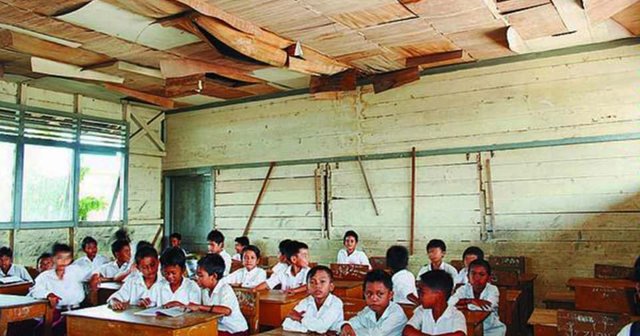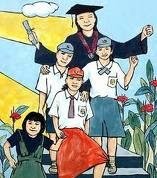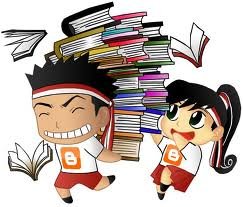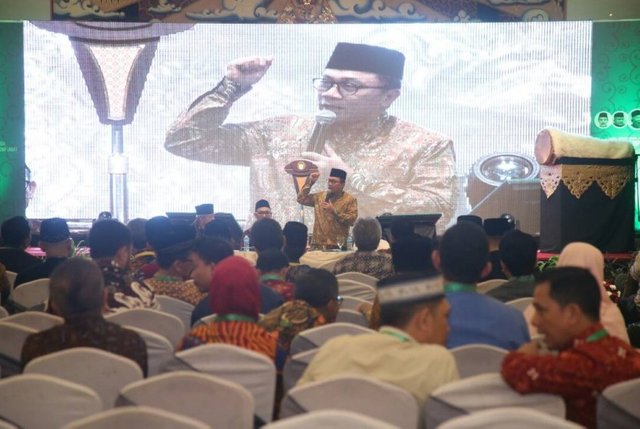RE-PHILOSOPHICAL EDUCATION OF INDONESIA
Philosophy of Education in General

image source [1]
Simple education can be interpreted as a process of changing the attitude and behavior of a person or group of people in an effort to mature humans through efforts to develop self potential. So from that sense, we will agree that the essence of education is as a medium used in the process of humanizing humans. The process in question is how to lead humans in the search for science to move from ignorance to understand and believe in something that is studied / developed, developing the outward and spiritual potential of human beings.
To achieve the essence of education, each country has a philosophical element affecting the implementation of its education system. In general, the philosophy of education is closely related to the philosophy adopted by the country. This is due to the adjustment between educational goals and the purpose of the country. There are three main philosophies that are influential in the education system, namely: Capitalism, Socialism, and Pancasila. Each philosophy has different influences on its policies and practices relating to the education system.
The philosophy of capitalism makes schools a part of the industry, because the school is the provider of labor for the industry. Schools are co-opted by industrial and business mechanisms, where schools are the instruments of economic production. Thus, the educational curriculum is also affected, for example in terms of determining which science needs to be learned by learners, tailored to the needs of the industrial world. Then create a curriculum that is fully capitalistic character.
There are three influences of capitalism on school, the relationship between capitalism and education has resulted in school practices that tend to lead to economic control by the elite. In addition, the relationship between capitalism and science has made the goal of science limited to the pursuit of profit. And the marriage between capitalism and education and capitalism and science has created the foundation for the science of education that emphasizes material values by ignoring the values of humanity, justice and human dignity. In the end, learners in our educational world lose the sensitivity of humanity replaced by the calculation of materialism life.The second philosophy is philosophical socialism. In principle the concept of socialism in education provides the basis that education is the right of all groups of society regardless of social class. There is no economic barrier that prevents a person from attending school, because discrimination is considered an act of capitalism. In a socialist state, everyone feels that he is equal to others, and everyone has the right to education.
The world of education in a socialist country, referring to the general characteristics of the socialist state. The characteristic of doctrinization as well as total devotion to the state, does not escape the socialist state education system itself. Here the world of education or school is useful as the creation of cadres loyal to their country. Because in addition to the giving of general subjects, they are also required to be creative which aims for the progress of their own country. Also the ideological principles of the state are instilled at an early age. So that no students or students who forget the ideology of his own country. It is the consolidation of the ideology that makes them very faithful to their country.
In Indonesia there is a philosophical education known as Pancasila. The goal of Pancasila education is to direct the attention to the moral that is expected to materialize in everyday life, ie the behavior that exudes faith and piety towards God Almighty in a society consisting of various religious, cultural, and diverse groups of interests, mutual interests over the interests of individuals and groups so that differences of thought are directed to the behavior that supports the effort of realization of social justice for all Indonesian people.
The purpose of education in Pancasila is defined as a set of intellectual actions of competence-oriented responsibilities in their respective professions. The competence in question is a set of intellectual actions, full of responsibility as a citizen in solving various problems in the life of society, nation and state by applying thoughts based on the values of Pancasila. The intellectual property is reflected in the skill, the accuracy and the success of acting, while the full nature of responsibility is shown as the rightness of action judging from aspects of science and technology, ethics or religious and cultural propriety.
Philosophy in Education Indonesia
When we talk about the philosophy of Indonesian education, we can not heed the essence of Indonesian education itself. Education Indonesia is a conscious effort to prepare learners through counseling, teaching, and or training for its future role, and national education is an education rooted in Indonesian culture and based on Pancasila and the 1945 Constitution, and function to develop the ability and form the character and civilization of a dignified nation in order to educate the nation's life.
From the description can be understood that the education of Indonesia based on Pancasila. Indonesian education is structured by considering the values contained in Pancasila. This would have been appropriate, given that the values contained in Pancasila had covered all the personality of the nation. Indonesian education leads to the creation of an Indonesian human who has spiritual, intellectual, and personality spiritual intelligence.But in the implementation, there are various irregularities that make the philosophy of Pancasila as if reduced and turned the bow into a capitalist philosophy. Though this capitalist understanding is less suitable to be applied in Indonesia. This is exacerbated by the condition of the Indonesian education process that is not yet practical but only theoretical because it is more concerned with the development of the intellectual aspect than the praxis aspect. This is due to the lack of balanced application of Cognitive, Affective and Psychomotor aspects in the education process in Indonesia
Government policies related to national education are always reinforced by the argument "in accordance with the values of Pancasila". Whereas the implementation in the field says otherwise, what happens is the development of capitalist philosophy due to the confusion contained in every government policy. Capitalist understandings seem to be "accommodated" by the presence of government regulations that often collide with each other. This makes the philosophy of Pancasila seemingly eroded and merely becomes a "shield" in any policy relating to national education. And some people seem indifferent and let the capitalist understand develop, it is not aware they have also been affected.
Noble ideals of education that is so noble today has been neglected by society. The desire to give birth to individuals who have emotional / spiritual intelligence, intellectual intelligence and have such reduced skills. Education is finally seen by society from the perspective of materialism and capitalism. This can be seen from the motivation of the community to follow education. Motivation is reduced to the motive for getting a decent job with income orientation, no longer knowledge-oriented, intelligence and awareness. Currently people go to school because they want to be able to produce jobs.
As a result the school is the place to get a diploma, because the diploma is the main requirement to get a job. This implies the attitude and behavior of both the community and learners who are willing to do anything to get a diploma. The tradition of cheating, plagiarism, bribing, paying diplomas, paying thesis, and others increasingly entrenched because that's what is "preferred". So today we will find it difficult to find educational output that is genuinely conscious of the importance of knowledge, which has a critical awareness of reality, and which has high sensitivity. There is an output that has a high individual attitude, is not mature in knowledge and does not understand the meaning of life. And now this kind of output is a lot of managing this country.
The overarching perceptions of the "value" aspect made Indonesian education lose direction. Students are required to get the highest score regardless of the understanding of the competence of learners. Learners are directed to get high marks on certain subjects that are not necessarily in accordance with their interests and competencies. This resulted in learners can not develop the potential of self-owned because terbelenngu by the teaching system. The existing curriculum also requires schools to compete freely and achieve the best predicate. This resulted in the implantation of moral and ethical values eroded because the school has tried to justify all means.
Implementation of the current curriculum of education is also not in accordance with the educational goals listed in Law no. 20 Year 2003 on National Education System. In the Act, the purpose of education is to have a spiritual power of religion, self-control, personality, intelligence, noble character, as well as the skills needed himself, society, nation and State. In practice, however, this objective is reduced and seems neglected because the education system is less able to accommodate the implementation of that goal. The curriculum is only a mere standard reference not supported by real implementation.
Indonesian education is increasingly capitalist after the privatization of education. In this case the government loosened the educational sector managers (private parties) to start competing against each other. For educational managers who win the competition will get more education service users. Capital from the manager of the education sector will enter and can be accumulated. When binding there will be a monopoly, so the pricing (education costs) without any supply and demand in advance with the users of education services. Educational managers also offer a price (tuition fee) without thinking about the ability of the users of education services. Obviously this will be detrimental to the users of education services, because they are not given the opportunity to bid the price (tuition fee). Finally, there will be gaps that rich people can get the education. As for the users of educational services that are less able, will be difficult in getting the education.
Restoring Philosophical Pancasila
Because education practices in Indonesia are currently less suitable, it is necessary to make efforts to restore the Indonesian education system in the right direction that is philosophy in Pancasila. These efforts must be integrated with each other so that effectiveness and efficiency occur and no deviation occurs. The first effort that needs to be done is the government to revise the regulations related to privatization / privatization of education. By stricter tightening and regulation, the government can indirectly reduce the impacts of the classification of community groups. This is to reduce the development of capitalist understanding.
The second attempt is to restore responsibility for the implementation of education to the State and manifested by concrete action. This is in accordance with the mandate of the 1945 Constitution Article 31 on the right of citizens to receive basic education. With a budget allocation of 20 percent of the total APBN, the government can certainly take full advantage of the budget to develop national education. The existence of School Operational Assistance program (BOS), actually has been good enough, but often the misuse in the distribution. For that, there needs to be a much more strict supervision related to the use of BOS funds and in the process of distribution.Furthermore, the government can change the curriculum orientation toward the competence of learners not value. Learners are directed to have competence in accordance with the educational goals listed in Law No.20 of 2003 on National Education System. By changing the orientation of the curriculum, it will also affect the public perception of education. If all this time the public sees education in a narrow sense, then the existence of these efforts can make people see education in a broader sense. The learning process will run much more effectively with the emergence of public awareness of the importance of competence in education.
The government can standardize education nationally. However, this national standard should not be an evaluation of the success or failure of the learning process. It would be better if these standards were made to improve the learning process more precisely according to the characteristics of each different region. The government can make this standard to improve the quality of learning facilities and infrastructure in educational institutions. Because it can not be denied that educational facilities and infrastructure in Indonesia is not evenly distributed and there is still gap between regions. Facilities and infrastructure include buildings, laboratories, libraries and other facilities and the quality of educators to be improved. If learning facilities and infrastructure are of good quality,
Education Indonesia should have an element of freedom for every educator to develop their learning program. Governments can make curriculum standards to be developed and implemented in accordance with the characteristics of learners. In addition, the government oversees the implementation of the learning process in order to be right on target. This effort is much more precise than the making of a standard curriculum that makes educators seem chained so much like today many educators are forced to do unethical things to meet the demands of the curriculum.
In addition, the effort that can be done is to re-echo the motto Ing Ngarso Sung Tulodho, Ing Madyo Mangun Karso, and Tut Wuri Handayani in the education process in Indonesia. Ing Ngarso Sung Tulodho This tagline comes from the word "Ing Ngarso" which means in front, "Sung" means giving or becoming, and "Tuladha" means example or example. The meaning of Ing Ngarso Sung Tulodho being an educator must be able to provide good role models. So the role model can be an example for the learners.
Ing Madyo Mangun Karso This tagline comes from the word "Ing Madyo" meaning in the middle, "Mangun" means generating or evocative and "Karso" is defined as a form of will or intention. So the meaning of the word is that one educator must also be able to arouse or inspire the spirit of the learners to learn and develop the potential. Educators should be able to assist and guide learners through the learning process.
Tut Wuri Handayani This slogan comes from the word "Tut" which means to follow, "Wuri" means behind, and "Handayani" is to give power, influence, stimulate, guide, and direct the students. So Tut Wuri Handayani is an educator following from behind by giving freedom, moral encouragement to the students but not releasing from supervision. In this case, the educator also acts as a facilitator who strives to continue to provide various programs that are able to provide innovations in their environment by creating a more conducive atmosphere to build creativity in accordance with tasks and duties.
Indonesia's education condition has actually had a fairly good philosophical foundation of Pancasila philosophy. But in practice it is a growing capitalist philosophy. To that end all stakeholders must synergize and make efforts that are integrated in restoring the Indonesian education system back to the philosophical Pancasila. This is very important to do, given the formation of the nation's personality character is done through education. With the creation of educational process based on Pancasila, it will create human humanizing process that is accompanied by spiritual spiritual intelligence, intellectual intelligence and intelligence personality.



science to move from ignorance to understand and believe in something that is studied / developed, developing the outward